-
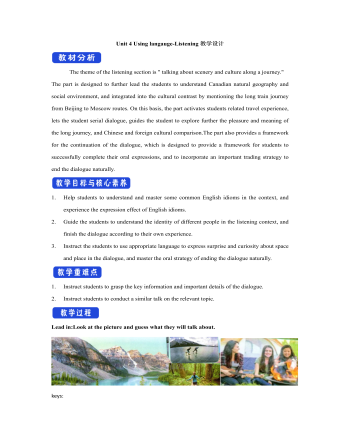
新人教版高中英语选修2Unit 4 Using langauge-Listening教学设计
The theme of the listening section is " talking about scenery and culture along a journey."The part is designed to further lead the students to understand Canadian natural geography and social environment, and integrated into the cultural contrast by mentioning the long train journey from Beijing to Moscow routes. On this basis, the part activates students related travel experience, lets the student serial dialogue, guides the student to explore further the pleasure and meaning of the long journey, and Chinese and foreign cultural comparison.The part also provides a framework for the continuation of the dialogue, which is designed to provide a framework for students to successfully complete their oral expressions, and to incorporate an important trading strategy to end the dialogue naturally.1. Help students to understand and master some common English idioms in the context, and experience the expression effect of English idioms.2. Guide the students to understand the identity of different people in the listening context, and finish the dialogue according to their own experience.3. Instruct the students to use appropriate language to express surprise and curiosity about space and place in the dialogue, and master the oral strategy of ending the dialogue naturally.1. Instruct students to grasp the key information and important details of the dialogue.2. Instruct students to conduct a similar talk on the relevant topic.
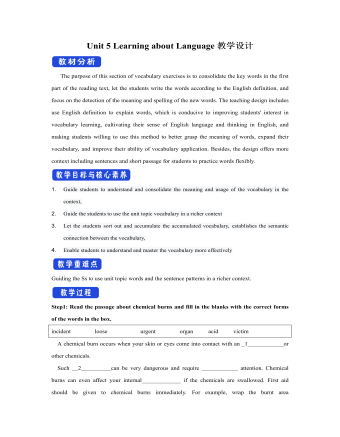
新人教版高中英语选修2Unit 5 Learning about Language教学设计
The purpose of this section of vocabulary exercises is to consolidate the key words in the first part of the reading text, let the students write the words according to the English definition, and focus on the detection of the meaning and spelling of the new words. The teaching design includes use English definition to explain words, which is conducive to improving students' interest in vocabulary learning, cultivating their sense of English language and thinking in English, and making students willing to use this method to better grasp the meaning of words, expand their vocabulary, and improve their ability of vocabulary application. Besides, the design offers more context including sentences and short passage for students to practice words flexibly.1. Guide students to understand and consolidate the meaning and usage of the vocabulary in the context, 2. Guide the students to use the unit topic vocabulary in a richer context3. Let the students sort out and accumulate the accumulated vocabulary, establishes the semantic connection between the vocabulary,4. Enable students to understand and master the vocabulary more effectivelyGuiding the Ss to use unit topic words and the sentence patterns in a richer context.Step1: Read the passage about chemical burns and fill in the blanks with the correct forms of the words in the box.
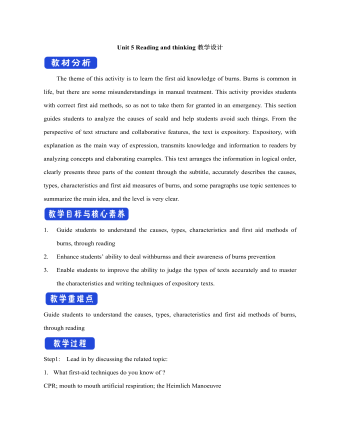
新人教版高中英语选修2Unit 5 Reading and thinking教学设计
The theme of this activity is to learn the first aid knowledge of burns. Burns is common in life, but there are some misunderstandings in manual treatment. This activity provides students with correct first aid methods, so as not to take them for granted in an emergency. This section guides students to analyze the causes of scald and help students avoid such things. From the perspective of text structure and collaborative features, the text is expository. Expository, with explanation as the main way of expression, transmits knowledge and information to readers by analyzing concepts and elaborating examples. This text arranges the information in logical order, clearly presents three parts of the content through the subtitle, accurately describes the causes, types, characteristics and first aid measures of burns, and some paragraphs use topic sentences to summarize the main idea, and the level is very clear.1. Guide students to understand the causes, types, characteristics and first aid methods of burns, through reading2. Enhance students’ ability to deal withburnss and their awareness of burns prevention3. Enable students to improve the ability to judge the types of texts accurately and to master the characteristics and writing techniques of expository texts.Guide students to understand the causes, types, characteristics and first aid methods of burns, through readingStep1: Lead in by discussing the related topic:1. What first-aid techniques do you know of ?CPR; mouth to mouth artificial respiration; the Heimlich Manoeuvre
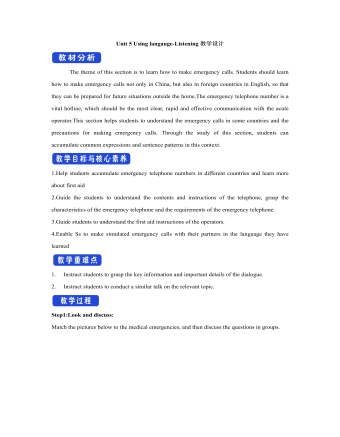
新人教版高中英语选修2Unit 5 Using langauge-Listening教学设计
The theme of this section is to learn how to make emergency calls. Students should learn how to make emergency calls not only in China, but also in foreign countries in English, so that they can be prepared for future situations outside the home.The emergency telephone number is a vital hotline, which should be the most clear, rapid and effective communication with the acute operator.This section helps students to understand the emergency calls in some countries and the precautions for making emergency calls. Through the study of this section, students can accumulate common expressions and sentence patterns in this context. 1.Help students accumulate emergency telephone numbers in different countries and learn more about first aid2.Guide the students to understand the contents and instructions of the telephone, grasp the characteristics of the emergency telephone and the requirements of the emergency telephone.3.Guide students to understand the first aid instructions of the operators.4.Enable Ss to make simulated emergency calls with their partners in the language they have learned1. Instruct students to grasp the key information and important details of the dialogue.2. Instruct students to conduct a similar talk on the relevant topic.Step1:Look and discuss:Match the pictures below to the medical emergencies, and then discuss the questions in groups.
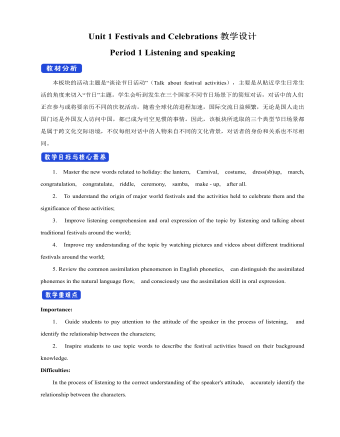
新人教版高中英语必修3Unit 1 Festivals and Celebrations教学设计一
本板块的活动主题是“谈论节日活动”(Talk about festival activities),主要是从贴近学生日常生活的角度来切入“节日”主题。学生会听到发生在三个国家不同节日场景下的简短对话,对话中的人们正在参与或将要亲历不同的庆祝活动。随着全球化的进程加速,国际交流日益频繁,无论是国人走出国门还是外国友人访问中国,都已成为司空见惯的事情。因此,该板块所选取的三个典型节日场景都是属于跨文化交际语境,不仅每组对话中的人物来自不同的文化背景,对话者的身份和关系也不尽相同。1. Master the new words related to holiday: the lantern, Carnival, costume, dress(sb)up, march, congratulation, congratulate, riddle, ceremony, samba, make - up, after all. 2. To understand the origin of major world festivals and the activities held to celebrate them and the significance of these activities;3. Improve listening comprehension and oral expression of the topic by listening and talking about traditional festivals around the world;4. Improve my understanding of the topic by watching pictures and videos about different traditional festivals around the world;5. Review the common assimilation phenomenon in English phonetics, can distinguish the assimilated phonemes in the natural language flow, and consciously use the assimilation skill in oral expression. Importance:1. Guide students to pay attention to the attitude of the speaker in the process of listening, and identify the relationship between the characters;2. Inspire students to use topic words to describe the festival activities based on their background knowledge. Difficulties:In the process of listening to the correct understanding of the speaker's attitude, accurately identify the relationship between the characters.
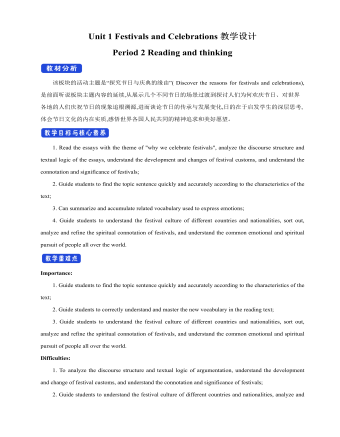
新人教版高中英语必修3Unit 1 Festivals and Celebrations教学设计三
*wide range of origins(= a great number of different origins, many kinds of origins)*It featured a parade and a great feast with music, dancing, and sports. (=A parade and a great feast with music, dancing, and sports were included as important parts of the Egyptian harvest festival.)*.. some traditions may fade away and others may be established.(= Some traditions may disappear gradually, while other new traditions may come into being.)Step 6 Practice(1) Listen and follow the tape.The teacher may remind the students to pay attention to the meaning and usage of the black words in the context, so as to prepare for the completion of the blanks in activity 5 and vocabulary exercises in the exercise book.(2) Students complete the text of activity 5 by themselves.The teacher needs to remind the students to fill in the blanks with the correct form of the vocabulary they have learned in the text.Students exchange their answers with their partners, and then teachers and students check their answers.(3)Finish the Ex in Activity 5 of students’ book.Step 7 Homework1. Read the text again, in-depth understanding of the text;2. Discuss the origin of festivals, the historical changes of related customs, the influence of commercial society on festivals and the connotation and essential meaning of festivals.3. Complete relevant exercises in the guide plan.1、通过本节内容学习,学生是否理解和掌握阅读文本中的新词汇的意义与用法;2、通过本节内容学习,学生能否结合文本特点快速而准确地找到主题句;3、通过本节内容学习,学生能否理清论说文的语篇结构和文本逻辑,了解节日风俗发展与变迁,感悟节日的内涵与意义。
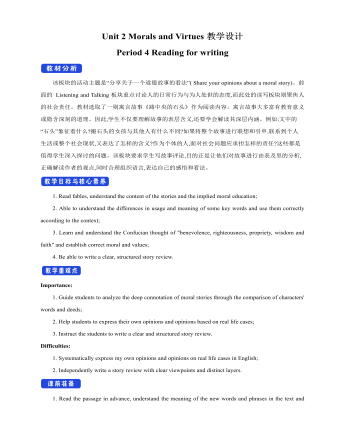
新人教版高中英语必修3Unit 2 Morals and Virtues教学设计四
3.Teachers ask different groups to report the answers to the questions and ask them to try different sentence patterns.The teacher added some sentence patterns for students to refer to when writing.Step 4 Writing taskActivity 51.Write the first draft.Students first review the evaluation criteria in activity 5, and then independently complete the draft according to the outline of activity 4, the answers to the questions listed in the group discussion and report, and the reference sentence pattern.2.Change partners.The teacher guides the students to evaluate their partner's composition according to the checklist of activity 5 and proposes Suggestions for modification.3.Finalize the draft.Based on the peer evaluation, students revise their own compositions and determine the final draft.Finally, through group recommendation, the teacher selects excellent compositions for projection display or reading aloud in class, and gives comments and Suggestions.Step 5 Showing writingActivity 5T call some Ss to share their writing.Step 6 Homework1. Read the passage in this section to better understand the passage.2. Carefully understand the hierarchical structure of the article, and deeply understand the plot of the story according to the causes, process and results;3. Independently complete the relevant exercises in the guide plan.1、通过本节内容学习,学生是否理解和掌握阅读文本中的新词汇的意义与用法;2、通过本节内容学习,学生能否通过人物言行的对比分析道德故事的深层内涵;3、通过本节内容学习,学生能否根据故事的起因、经过和结果来深入理解故事的情节,从而了解文章的层次结构;4、结合现实生活案例发表自己的见解和看法,写一篇观点明确、层次分明的故事评论。
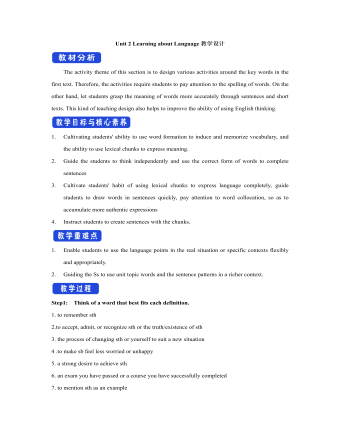
新人教版高中英语选修2Unit 2 Learning about Language教学设计
The activity theme of this section is to design various activities around the key words in the first text. Therefore, the activities require students to pay attention to the spelling of words. On the other hand, let students grasp the meaning of words more accurately through sentences and short texts. This kind of teaching design also helps to improve the ability of using English thinking.1. Cultivating students' ability to use word formation to induce and memorize vocabulary, and the ability to use lexical chunks to express meaning.2. Guide the students to think independently and use the correct form of words to complete sentences3. Cultivate students' habit of using lexical chunks to express language completely, guide students to draw words in sentences quickly, pay attention to word collocation, so as to accumulate more authentic expressions4. Instruct students to create sentences with the chunks.1. Enable students to use the language points in the real situation or specific contexts flexibly and appropriately.2. Guiding the Ss to use unit topic words and the sentence patterns in a richer context.Step1: Think of a word that best fits each definition.1. to remember sth2.to accept, admit, or recognize sth or the truth/existence of sth3. the process of changing sth or yourself to suit a new situation4 .to make sb feel less worried or unhappy5. a strong desire to achieve sth
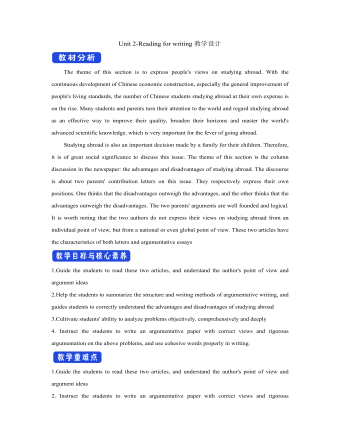
新人教版高中英语选修2Unit 2 Reading for writing教学设计
The theme of this section is to express people's views on studying abroad. With the continuous development of Chinese economic construction, especially the general improvement of people's living standards, the number of Chinese students studying abroad at their own expense is on the rise. Many students and parents turn their attention to the world and regard studying abroad as an effective way to improve their quality, broaden their horizons and master the world's advanced scientific knowledge, which is very important for the fever of going abroad. Studying abroad is also an important decision made by a family for their children. Therefore, it is of great social significance to discuss this issue. The theme of this section is the column discussion in the newspaper: the advantages and disadvantages of studying abroad. The discourse is about two parents' contribution letters on this issue. They respectively express their own positions. One thinks that the disadvantages outweigh the advantages, and the other thinks that the advantages outweigh the disadvantages. The two parents' arguments are well founded and logical. It is worth noting that the two authors do not express their views on studying abroad from an individual point of view, but from a national or even global point of view. These two articles have the characteristics of both letters and argumentative essays1.Guide the students to read these two articles, and understand the author's point of view and argument ideas2.Help the students to summarize the structure and writing methods of argumentative writing, and guides students to correctly understand the advantages and disadvantages of studying abroad3.Cultivate students' ability to analyze problems objectively, comprehensively and deeply
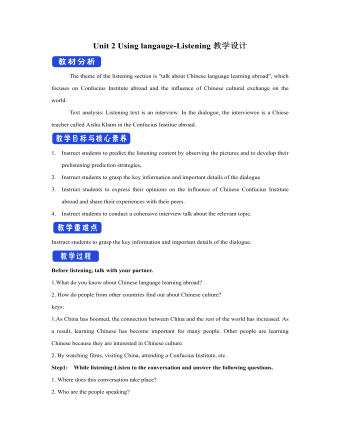
新人教版高中英语选修2Unit 2 Using langauge-Listening教学设计
? B: Absolutely! Getting involved with Chinese cultural activities there definitely helped a lot. I got to practice my Chinese on a daily basis, and I could learn how native Chinese speakers spoke.? A: What do you feel is your biggest achievement?? B: Learning Chinese characters! I have learnt about 1,500 so far. When I first started, I didn't think it was even going to be possible to learn so many, but now I find that I can read signs, menus, and even some easy newspaper articles.? A: What are you most keen on?? B: I've really become keen on learning more about the Chinese culture, in particular Chinese calligraphy. As I have learnt Chinese characters, I have developed a great appreciation for their meaning. I want to explore Chinese characters by learning how to write them in a more beautiful way. ? A: Finally, what do you want to say to anyone interested in learning Chinese?? I have really become keen on learning more about the Chinese culture, in particular Chinese Calligraphy. As I have learnt Chinese character, I have developed a great appreciation for their meaning. I want to explore Chinese characters by learning how to write them in a more beautiful way.? A: Finally, what do you want to say to anyone interested in learning Chinese?? B: I'd say, give it a shot! While some aspects may be difficult, it is quite rewarding and you will be happy that you tried.? A: Thanks for your time. ? B:You're welcome.
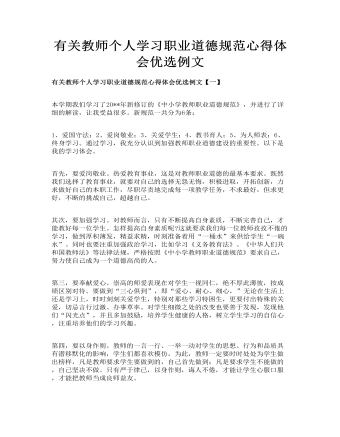
有关教师个人学习职业道德规范心得体会优选例文
第三,要奉献爱心。崇高的师爱表现在对学生一视同仁,绝不厚此薄彼,按成绩区别对待。要做到“三心俱到”,即“爱心、耐心、细心,”无论在生活上还是学习上,时时刻刻关爱学生,特别对那些学习特困生,更要付出特殊的关爱,切忌言行过激、办事草率。对学生细微之处的改变也要善于发现,发现他们“闪光点”,并且多加鼓励,培养学生健康的人格,树立学生学习的自信心,注重培养他们的学习兴趣。 第四,要以身作则。教师的一言一行、一举一动对学生的思想、行为和品质具有潜移默化的影响,学生们都喜欢模仿。为此,教师一定要时时处处为学生做出榜样,凡是教师要求学生要做到的,自己首先做到;凡是要求学生不能做的,自己坚决不做。只有严于律已,以身作则,诲人不倦,才能让学生心服口服,才能把教师当成良师益友。
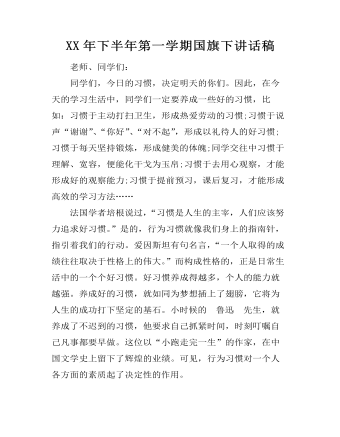
XX年下半年第一学期国旗下讲话稿
老师、同学们:同学们,今日的习惯,决定明天的你们。因此,在今天的学习生活中,同学们一定要养成一些好的习惯,比如:习惯于主动打扫卫生,形成热爱劳动的习惯;习惯于说声“谢谢”、“你好”、“对不起”,形成以礼待人的好习惯;习惯于每天坚持锻炼,形成健美的体魄;同学交往中习惯于理解、宽容,便能化干戈为玉帛;习惯于去用心观察,才能形成好的观察能力;习惯于提前预习,课后复习,才能形成高效的学习方法……法国学者培根说过,“习惯是人生的主宰,人们应该努力追求好习惯。”是的,行为习惯就像我们身上的指南针,指引着我们的行动。爱因斯坦有句名言,“一个人取得的成绩往往取决于性格上的伟大。”而构成性格的,正是日常生活中的一个个好习惯。好习惯养成得越多,个人的能力就越强。养成好的习惯,就如同为梦想插上了翅膀,它将为人生的成功打下坚定的基石。小时候的 鲁迅 先生,就养成了不迟到的习惯,他要求自己抓紧时间,时刻叮嘱自己凡事都要早做。这位以“小跑走完一生”的作家,在中国文学史上留下了辉煌的业绩。可见,行为习惯对一个人各方面的素质起了决定性的作用。

新人教版高中英语必修3Unit 5 The Value of Money-Discovering Useful Structures导学案
4.They were going to find someone to take part in their bet when they saw Henry walking on the street outside.[归纳]1.过去将来时的基本构成和用法过去将来时由“would+动词原形”构成,主要表示从过去某一时间来看将要发生的动作(尤其用于宾语从句中),还可以表示过去的动作习惯或倾向。Jeff knew he would be tired the next day.He promised that he would not open the letter until 2 o'clock.She said that she wouldn't do that again.2.表示过去将来时的其他表达法(1)was/were going to+动词原形:该结构有两个主要用法,一是表示过去的打算,二是表示在过去看来有迹象表明将要发生某事。I thought it was going to rain.(2)was/were to+动词原形:主要表示过去按计划或安排要做的事情。She said she was to get married next month.(3)was/were about to+动词原形:表示在过去看来即将要发生的动作,由于本身已含有“即将”的意味,所以不再与表示具体的将来时间状语连用。I was about to go to bed when the phone rang.(4)was/were+现在分词:表示在过去看来即将发生的动作,通常可用于该结构中的动词是come,go,leave,arrive,begin,start,stop,close,open,die,join,borrow,buy等瞬间动词。Jack said he was leaving tomorrow.
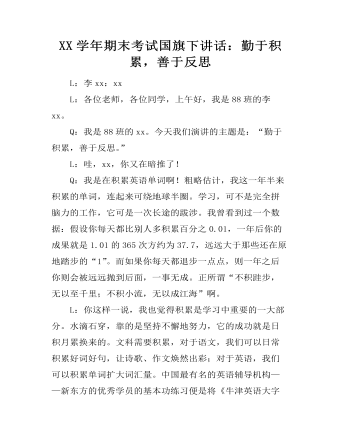
XX学年期末考试国旗下讲话:勤于积累,善于反思
L:李xx:xxL:各位老师,各位同学,上午好,我是88班的李xx。Q:我是88班的xx。今天我们演讲的主题是:“勤于积累,善于反思。”L:哇,xx,你又在暗推了!Q:我是在积累英语单词啊!粗略估计,我这一年半来积累的单词,连起来可绕地球半圈。学习,可不是完全拼脑力的工作,它可是一次长途的跋涉。我曾看到过一个数据:假设你每天都比别人多积累百分之0.01,一年后你的成果就是1.01的365次方约为37.7,远远大于那些还在原地踏步的“1”。而如果你每天都退步一点点,则一年之后你则会被远远抛到后面,一事无成。正所谓“不积跬步,无以至千里;不积小流,无以成江海”啊。L:你这样一说,我也觉得积累是学习中重要的一大部分。水滴石穿,靠的是坚持不懈地努力,它的成功就是日积月累换来的。文科需要积累,对于语文,我们可以日常积累好词好句,让诗歌、作文焕然出彩;对于英语,我们可以积累单词扩大词汇量。中国最有名的英语辅导机构——新东方的优秀学员的基本功练习便是将《牛津英语大字典》反复背诵六七遍,可见词汇的积累是有多么重要;对于社会,我们则可以积累历史知识。
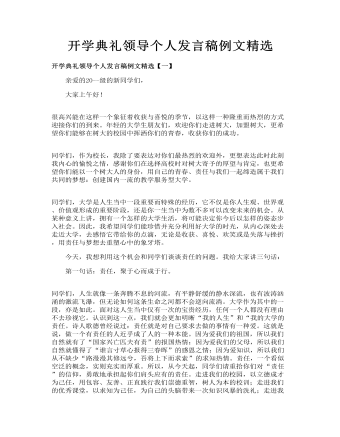
开学典礼领导个人发言讲话稿例文精选
同学们,人生就像一条奔腾不息的河流,有平静舒缓的静水深流,也有波涛汹涌的激流飞瀑,但无论如何这条生命之河都不会逆向流淌。大学作为其中的一段,亦是如此。面对这人生当中仅有一次的宝贵经历,任何一个人都没有理由不去珍视它。认识到这一点,我们就会更加明晰“我的人生”和“我的大学的责任。诗人歌德曾经说过:责任就是对自己要求去做的事情有一种爱。这就是说,做一个有责任的人近乎成了人的一种本能。因为爱我们的祖国,所以我们自然就有了“国家兴亡匹夫有责”的报国热情;因为爱我们的父母,所以我们自然就懂得了“谁言寸草心报得三春晖”的感恩之情;因为爱知识,所以我们从不缺少“路漫漫其修远兮,吾将上下而求索”的求知热情。责任,一个看似空泛的概念,实则充实而厚重。
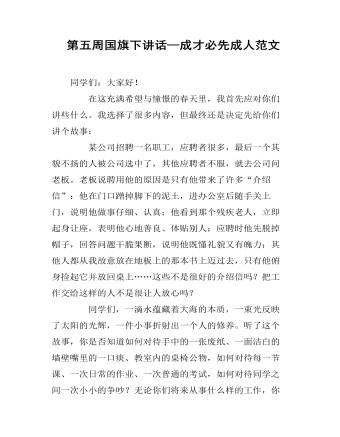
第五周国旗下讲话—成才必先成人范文
同学们:大家好!在这充满希望与憧憬的春天里,我首先应对你们讲些什么。我选择了很多内容,但最终还是决定先给你们讲个故事:某公司招聘一名职工,应聘者很多,最后一个其貌不扬的人被公司选中了,其他应聘者不服,就去公司问老板。老板说聘用他的原因是只有他带来了许多“介绍信”:他在门口蹭掉脚下的泥土,进办公室后随手关上门,说明他做事仔细、认真;他看到那个残疾老人,立即起身让座,表明他心地善良、体贴别人;应聘时他先脱掉帽子,回答问题干脆果断,说明他既懂礼貌又有魄力;其他人都从我故意放在地板上的那本书上迈过去,只有他俯身捡起它并放回桌上……这些不是很好的介绍信吗?把工作交给这样的人不是很让人放心吗?同学们,一滴水蕴藏着大海的本质,一束光反映了太阳的光辉,一件小事折射出一个人的修养。听了这个故事,你是否知道如何对待手中的一张废纸
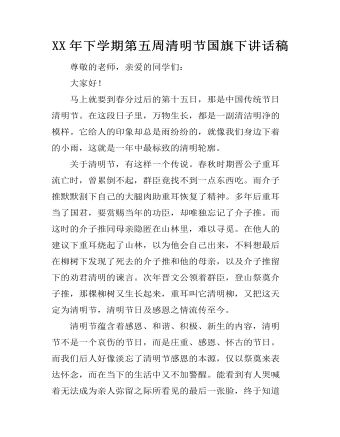
XX年下学期第五周清明节国旗下讲话稿
尊敬的老师,亲爱的同学们:大家好!马上就要到春分过后的第十五日,那是中国传统节日清明节。在这段日子里,万物生长,都是一副清洁明净的模样。它给人的印象却总是雨纷纷的,就像我们身边下着的小雨,这就是一年中最标致的清明轮廓。关于清明节,有这样一个传说。春秋时期晋公子重耳流亡时,曾累倒不起,群臣竟找不到一点东西吃。而介子推默默割下自己的大腿肉助重耳恢复了精神。多年后重耳当了国君,要赏赐当年的功臣,却唯独忘记了介子推。而这时的介子推同母亲隐匿在山林里,难以寻觅。在他人的建议下重耳烧起了山林,以为他会自己出来,不料想最后在柳树下发现了死去的介子推和他的母亲,以及介子推留下的劝君清明的谏言。次年晋文公领着群臣,登山祭奠介子推,那棵柳树又生长起来,重耳叫它清明柳,又把这天定为清明节,清明节日及感恩之情流传至今。
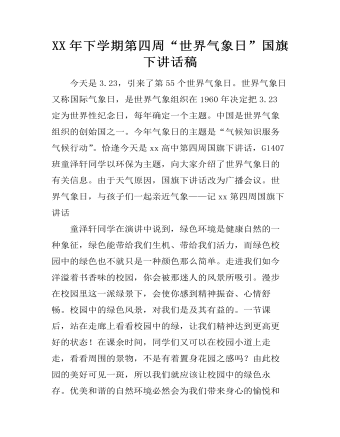
XX年下学期第四周“世界气象日”国旗下讲话稿
今天是3.23,引来了第55个世界气象日。世界气象日又称国际气象日,是世界气象组织在1960年决定把3.23定为世界性纪念日,每年确定一个主题。中国是世界气象组织的创始国之一。今年气象日的主题是“气候知识服务气候行动”。恰逢今天是xx高中第四周国旗下讲话,G1407班童泽轩同学以环保为主题,向大家介绍了世界气象日的有关信息。由于天气原因,国旗下讲话改为广播会议。世界气象日,与孩子们一起亲近气象——记xx第四周国旗下讲话童泽轩同学在演讲中说到,绿色环境是健康自然的一种象征,绿色能带给我们生机、带给我们活力,而绿色校园中的绿色也不就只是一种颜色那么简单。走进我们如今洋溢着书香味的校园,你会被那迷人的风景所吸引。漫步在校园里这一派绿景下,会使你感到精神振奋、心情舒畅。校园中的绿色风景,对我们是及其有益的。一节课后,站在走廊上看看校园中的绿,让我们精神达到更高更好的状态!在课余时间,同学们又可以在校园小道上走走,看看周围的景物,不是有着置身花园之感吗?
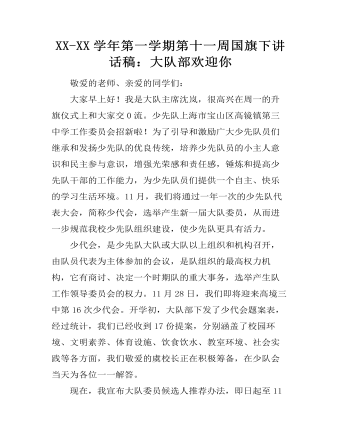
XX-XX学年第一学期第十一周国旗下讲话稿:大队部欢迎你
敬爱的老师、亲爱的同学们:大家早上好!我是大队主席沈岚,很高兴在周一的升旗仪式上和大家交0流。少先队上海市宝山区高镜镇第三中学工作委员会招新啦!为了引导和激励广大少先队员们继承和发扬少先队的优良传统,培养少先队员的小主人意识和民主参与意识,增强光荣感和责任感,锤炼和提高少先队干部的工作能力,为少先队员们提供一个自主、快乐的学习生活环境。11月,我们将通过一年一次的少先队代表大会,简称少代会,选举产生新一届大队委员,从而进一步规范我校少先队组织建设,使少先队更具有活力。少代会,是少先队大队或大队以上组织和机构召开,由队员代表为主体参加的会议,是队组织的最高权力机构,它有商讨、决定一个时期队的重大事务,选举产生队工作领导委员会的权力。11月28日,我们即将迎来高境三中第16次少代会。开学初,大队部下发了少代会题案表,经过统计,我们已经收到17份提案,分别涵盖了校园环境、文明素养、体育设施、饮食饮水、教室环境、社会实践等各方面,我们敬爱的虞校长正在积极筹备,在少队会当天为各位一一解答。
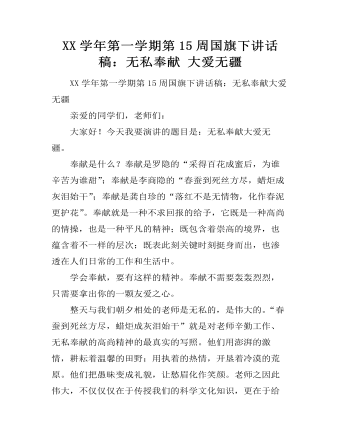
XX学年第一学期第15周国旗下讲话稿:无私奉献 大爱无疆
XX学年第一学期第15周国旗下讲话稿:无私奉献大爱无疆亲爱的同学们,老师们:大家好!今天我要演讲的题目是:无私奉献大爱无疆。奉献是什么?奉献是罗隐的“采得百花成蜜后,为谁辛苦为谁甜”;奉献是李商隐的“春蚕到死丝方尽,蜡炬成灰泪始干”;奉献是龚自珍的“落红不是无情物,化作春泥更护花”。奉献就是一种不求回报的给予,它既是一种高尚的情操,也是一种平凡的精神;既包含着崇高的境界,也蕴含着不一样的层次;既表此刻关键时刻挺身而出,也渗透在人们日常的工作和生活中。学会奉献,要有这样的精神。奉献不需要轰轰烈烈,只需要拿出你的一颗友爱之心。整天与我们朝夕相处的老师是无私的,是伟大的。“春蚕到死丝方尽,蜡炬成灰泪始干”就是对老师辛勤工作、无私奉献的高尚精神的最真实的写照。他们用澎湃的激情,耕耘着温馨的田野;用执着的热情,开垦着冷漠的荒原。

